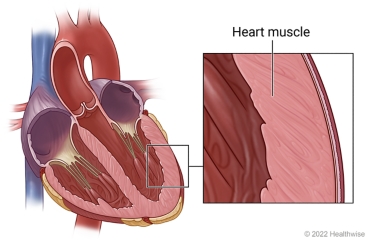Overview

Myocarditis is inflammation of the heart muscle. It might happen after an infection, such as COVID-19, strep throat, or tuberculosis. It may also be caused by a reaction to a medicine or toxin. Some autoimmune diseases, such as ulcerative colitis, cause it too. Myocarditis is a rare side effect of some COVID-19 vaccines.
Treatment depends on how severe the illness is. If your child is having other heart problems, the doctor will treat them at the same time. Your child may need medicine for their heart. Lifestyle changes such as getting more rest, reducing salt in the diet, or reducing exercise and activities may be part of the treatment.
Follow-up care is a key part of your child's treatment and safety. Be sure to make and go to all appointments, and call your doctor if your child is having problems. It's also a good idea to know your child's test results and keep a list of the medicines your child takes.
How can you care for your child at home?
- Be safe with medicines. Call your doctor if you think your child is having a problem with a medicine. You will get more details on the specific medicines your doctor prescribes.
- Ask your child's doctor what level and type of activity is safe.
- Don't let your child play sports or do intense exercise until the doctor says it's okay.
- Have your child rest when they feel tired.
- Ask the doctor when your child can go back to school or day care.
- Keep track of your child's weight each day, if your doctor asks you to.
- Give your child heart-healthy foods. This includes lots of fruits and vegetables, lean meats, nonfat and low-fat dairy products, and whole grains. For babies, make sure they are feeding well.
- Keep your child away from smoke or the aerosol mist from vaping. Do not smoke or vape or let anyone else smoke or vape around your child or in your home.
- Make sure your child stays up to date on all recommended vaccines. These help keep your child healthy.
- Be sure to take your child to all follow-up appointments and tests that your child's doctor recommends.
When should you call for help?
Call 911 anytime you think your child may need emergency care. For example, call if:
- Your child passes out (loses consciousness).
- Your child stops breathing or has severe trouble breathing. Signs may include:
- Turning blue.
- The belly moves in and out or the nostrils flare with every breath.
Call your doctor now or seek immediate medical care if:
- Your child has new or changed symptoms of heart failure, such as:
- Trouble breathing.
- Feeling dizzy or lightheaded.
- Swelling in the belly, legs, ankles, or feet.
- Sudden weight gain in 2 or 3 days. (Your doctor can tell you how much weight gain to watch for.)
- Your child has a fever.
- Your child has less energy or is sleeping more than usual or is not eating or drinking well.
- A baby or very young child has symptoms that may mean there is a problem. These include fast breathing, sweating while eating, not eating well, and not gaining enough weight.
Watch closely for changes in your child's health, and be sure to contact your doctor if your child has any problems.
Current as of: July 31, 2024
Author: Ignite Healthwise, LLC Staff
Clinical Review Board
All Ignite Healthwise, LLC education is reviewed by a team that includes physicians, nurses, advanced practitioners, registered dieticians, and other healthcare professionals.

